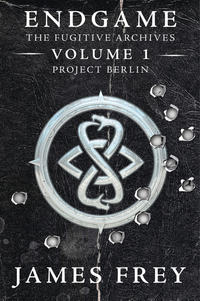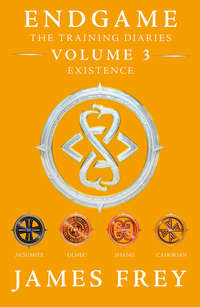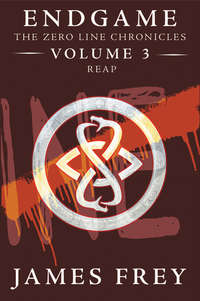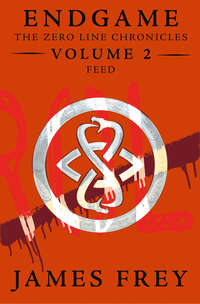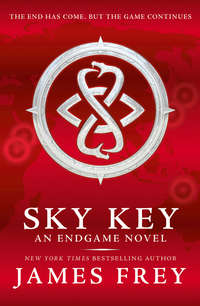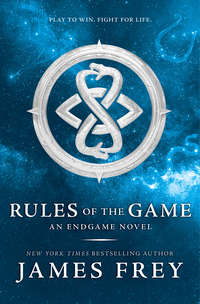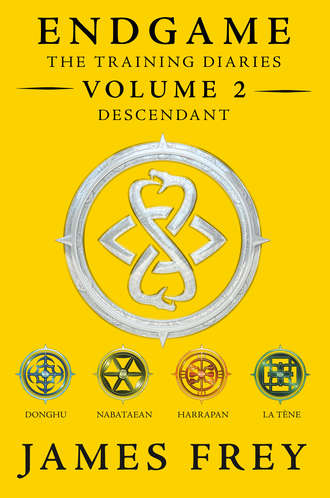
Полная версия
Descendant



Copyright
First Published in Great Britain by HarperCollinsPublishers in 2015.
1 London Bridge Street
London, SE1 9GF
www.harpercollins.co.uk
ENDGAME: THE TRAINING DIARIES VOLUME 2: DESCENDANT. Copyright © 2015 by Third Floor Fun, LLC. All rights reserved under International and Pan-American Copyright Conventions. By payment of the required fees, you have been granted the nonexclusive, nontransferable right to access and read the text of this e-book on-screen. No part of this text may be reproduced, transmitted, downloaded, decompiled, reverse-engineered, or stored in or introduced into any information storage and retrieval system, in any form or by any means, whether electronic or mechanical, now known or hereafter invented, without the express written permission of HarperCollins e-books.

Source ISBN: 97800062332684
Ebook Edition © February 2015 ISBN: 9780007585175
Version: 2015-02-18
Contents
Cover
Title Page
Copyright
La Tène AISLING
Harrapan SHARI
Nabataean MACCABEE
Donghu BAITSAKHAN
Excerpt from Endgame: The Calling
Marcus Loxias Megalos
Chiyoko Takeda
Excerpt from Endgame: The Training Diaries Volume 1: Origins
Minoan: MARCUS
About the Author
Books in the Endgame Series
About the Publisher
Twelve thousand years ago, they came. They descended from the sky amid smoke and fire, and created humanity and gave us rules to live by. They needed gold and they built our earliest civilizations to mine it for them. When they had what they needed, they left. But before they left, they told us that someday they would come back, and that when they did, a game would be played. A game that would determine our future.
This is Endgame.
For 10,000 years the lines have existed in secret. The 12 original lines of humanity. Each has to have a Player prepared at all times. A Player becomes eligible at 13 and ages out at 19. Each bloodline has its own measure of who is worthy to be chosen. Who is worthy of saving their people. They have trained generation after generation after generation in weapons, languages, history, tactics, disguise, assassination. Together the Players are everything: strong, kind, ruthless, loyal, smart, stupid, ugly, lustful, mean, fickle, beautiful, calculating, lazy, exuberant, weak. They are good and evil. Like you. Like all.
This is Endgame.
When the game starts, the Players will have to find three keys. The keys are somewhere on Earth. The only rule of Endgame is that there are no rules. Whoever finds the keys first wins the game.
These are the stories of the Players before they were chosen—of how they shed their normal lives and transformed into the Players they were meant to be.
These are the Training Diaries.
LA TÈNE
AISLING

This is the story Aisling Kopp, Player of the 3rd line, does not know.
This is the story Aisling Kopp will never know, because the only one who could tell it is dead.
This is the story of her life and her line—the story of how she began and how the world will end.
This is the story of a hero and a traitor, neither of them certain which is which.
This is the story before the story.
Before Aisling.
The end:
Declan Kopp stands at the mouth of the cave, a 2,500-year-old sword in his hand. The heft of it calms him. The familiar grip reminds him of a time when the Falcata was rightfully his to wield, a simpler time, when he could lay its blade against flesh and enjoy the kill.
A time before Aisling was alive, a time before Lorelei was dead, a time when he was young and foolish and the sword was a symbol of all things just and good.
Now it’s nothing but a symbol of the lines he’s crossed.
The people he’s betrayed.
The home he’s left behind and the family to which he can never return.
The ancient sword, like the polished stone in his pocket, like the baby whimpering in the dark depths of the cave, is a precious stolen good.
Not his to take—but taken nonetheless.
That’s what they would say, at least.
They: the High Council. The La Tène Player. His father.
Everyone who matters to him, or once did.
Once, he had so much in his life. Family, love, hope—the belief that his life’s mission was just and his future was fated. Once, he had certainty.
Now he has only his stolen child, and her birthright.
He has the Falcata, whose razor-sharp blade has taken 3,890 lives and awaits its next kill.
And he has a few precious hours, or maybe minutes, before they come for him and try to reclaim what he’s stolen—before he and the sword make their last stand.
The child’s cries echo through the dark.
“Peace, Aisling,” he calls to her. “Daddy’s here. Daddy will protect you, I promise.”
She’s too young to understand—and too young to recognize the lie. He can’t promise to protect her. Only to try.
He’s given up everything, trying to save his daughter from her fate—but still it’s not enough. The cave is surrounded. There’s no way out. No way down the mountain, not for him. The final battle is coming, and he will not survive it. He knows that.
He’s lured them here, knowing that.
They will pursue him wherever he goes. He finally understands: There is no safe place for him and his daughter, not in this world. He fought; he lost. Letting them follow him here is his last, final, desperate effort to make them see the truth.
If they see it—if he can make them see it—everything he’s given up will be worth it. Even his life.
The child cries and cries.
Declan can’t stand the sound of it.
He turns his back to the cave opening, even though he knows never to turn your back on the enemy.
He retreats into the dark, following the sound of his daughter’s cries, and lifts the squirming child into his arms.
At his touch, she quiets. He kisses her forehead, makes soothing noises, inhales the scent of her soft red hair, wonders if she will remember him.
If she will ever know how she came to be here on this lonely mountain, or why.
If she will ever forgive him for what he’s done, and the things he has wrought.
Aisling is still in his arms when they come for him.
Two of them, their headlamps sweeping across the dank cave walls. He could hide in the shadows, for just a little longer, but there’s no point. He’s come here to face them.
To try, one last time, to show them the truth.
“We know you’re in here, Declan.” It’s a young woman’s voice—Molly, his niece, who he’s known since she was born. The La Tène Player. He knows exactly how deadly she is; he trained her himself. “Show yourself.”
Declan does as he’s told, steps into the beam of light. Aisling squints and, recognizing Molly and the gray-haired man by her side, giggles and waves.
“We don’t want to hurt you,” Declan’s father says, lifting a rifle to his shoulder. “Just give us the child.”
The beginning:
Sometimes, Declan thinks, it began the day his inbox pinged with the strange anonymous message. You’ve been lied to, it said, no more than that, and he felt only a mild twinge of curiosity before sending it to the trash. Thinking spammers got more inventive every day. Thinking he was too clever to believe anyone’s lies.
Maybe it began the day his curiosity got the better of him, and he finally responded to one of the strange messages.
Or the day he stood in dark woods, met the eyes of a cloaked stranger who told him everything he’d ever believed in was a lie. Don’t you ever want to know why you fight, what you fight for? the woman asked, before melting back into the shadows, and for the first time, Declan did.
Maybe, he sometimes thinks, it began long before, on the day he first took his father’s rifle into his scrawny young arms, aimed at a paper target, pulled the trigger. “You will make a fine Player,” his father said, ruffling the fire-red hair that marked him as a Kopp. “You’ll make me proud.”
But maybe it didn’t really begin until he was a father himself. Until he understood what it meant to love unconditionally, with his whole self, to know he would give his life for his daughter. Until the High Council decreed that his infant daughter would be the Player once she came of age. Then he knew the time for waiting, for questioning, was over.
It was the time to act.
He managed to keep it together until the end of the High Council’s meeting, knowing there was no point in arguing. He’s aware of what they think of him: that he’s bitter and washed up, that he was warped by his tenure as a Player, by the fact that Endgame never happened. Some of them—his father among them—think he’s mad. So he smiled and nodded as if he were happy they wanted to turn his daughter into their puppet, an agent of needless death.
Then he hailed a taxi he couldn’t afford and held his breath as it sped down the Brooklyn-Queens Expressway, until the towers of Downtown Brooklyn came into sight and with them the dingy brownstone where his wife was waiting.
Now here he is, standing before the door of his apartment, taking a deep breath and preparing to change their lives forever. Thinking, How did I get here?
But he knows exactly how he got here.
And he knows what has to happen next.
Declan bursts into the apartment and finally lets his panic off the leash. “Pack everything!” he booms, into the tiny bedroom, where his money and passports are stashed, and his wife and little Aisling are sound asleep.
“Declan?” Lorelei blinks groggily on the bed, baby napping on her chest. She sleeps whenever the baby sleeps, which is never enough for either of them. “Quiet, hon. You’ll wake her.”
“We’ve got to go,” Declan says, in a quieter voice. He’s ripping through their tiny closet, throwing shirts and dresses haphazardly into a suitcase. “Now.”
“Go? Go where? It’s nearly midnight.” Gently, Lorelei settles Aisling into her crib. She goes to her husband, stands behind him, and wraps her arms around his waist, lets him feel her slow, steady breathing, the rhythm of her heartbeat. “Take a breath, Declan.”
Declan breathes.
“Now, tell me what happened.”
Declan turns to face Lorelei, the love of his life, the outsider who, for love of him, adopted his traditions and his people as her own. She did it because he asked her to—and now, because of that, because of him, their daughter is in danger.
This is all his fault, he thinks, panic blooming again.
“Declan.” She can always tell when he’s spinning out of control.
She’s always been the only one who can stop him.
She fixes her gaze on him, and, for just a moment, he lets himself get lost in her sea-gray eyes.
“It’s going to be okay,” she says, in soft, measured tones.
He knows he’s no longer the man she fell in love with, the man she married.
That man was full of righteous conviction, strong and proud; that man had been raised to believe he could save the world.
“Whatever it is this time, we can handle it,” she says, pressing a smooth palm to his stubbled cheek.
She married that Declan—and got saddled with this one instead, till death do they part. Erratic, paranoid, afraid of shadows, consumed by guilt. Shamed. Obsessed. Broken.
“Now, tell me what happened,” she says, once his breathing finally draws even with hers and his panic temporarily abates.
When he met her, he thought Lorelei was the miracle of his life.
Now he knows that the true miracle is that she still loves him, even now. But that might change when he answers her question. When she understands what loving him means for Aisling.
“The High Council has named the next generation’s Player,” Declan says. He takes his wife’s hand in his own, holds tight. “They’ve named our Aisling.”
She doesn’t gasp.
She doesn’t scream.
She doesn’t yank her hand away and castigate him for drawing her into his nightmare.
She only nods and says, “Okay. So what does that mean?”
“What does it mean?” He’s raging again. He needs to make her understand. “It means we have to get out of here, now. Disappear—go somewhere they can never find us.”
“Isn’t that a little dramatic, Declan?”
“Lor, are you hearing me? They want her to be the Player. They want to turn her into a soldier, brainwash her into this Endgame madness, just as they did me.”
“I’m not saying I want that either,” she says. “But can’t we just say no?”
Declan sighs. Were it only that easy. “It’s not like this is a game of tag and they decided she’s it,” he says. “This isn’t a game you can just decide not to play.”
The High Council doesn’t ask; the High Council commands.
Declan knew it was a possibility, of course. The Player has always been a Kopp, for as long as anyone can remember. But there are so many of them now, little Kopp children running around Queens, so many cousins he can’t remember all their names. What were the odds they would choose Aisling? They thought Declan an apostate, a madman—what were the odds they would name his daughter the Player?
“We don’t like it any more than you do,” the High Council’s leader told him at the meeting. “But the stones have spoken.”
“Screw the stones!” he shouted.
The High Council looked scandalized, all of them but his father, who simply looked tired. Pop was the first to give up on him, the first to accept that Declan had turned his back on his people. Or at least that was how Pop saw it. The move to Brooklyn from Queens, the railing against Endgame, the marriage to an outsider, the trips all over the world in search of answers to questions he wasn’t supposed to ask—Pop thinks Declan has rejected his family, his line, his sacred duties. Pop doesn’t understand, none of them do, that Declan loves his family and his people fiercely. He’s too old to be their Player, but he still sees himself as their warrior, charged with their protection. That’s why he fights them so hard: not because he’s a traitor, but because he’s loyal.
“The High Council has made its decision,” Pop said. “We journeyed to Stonehenge and asked our question. The stones gave us their answer, and the answer is Aisling.”
A gaggle of old men measuring angles of light and lengths of shadow, their protractors consigning Declan’s daughter to a useless life of blood. He wanted to scream, to overturn the table, to seize the Falcata from its place of honor on the council wall and slash off their heads—but none of that would help Aisling. So instead he pretended to accept it, and came home to do what needed to be done.
“If they want her to Play, she’ll Play,” Declan tells Lorelei. “Whatever we want, whatever she wants, they won’t care. They’ll turn her into a killer. They’ll make her help the gods with their genocide. And if she dies, they’ll shrug and pretend to care, and then they’ll throw another poor child to the wolves.”
What he doesn’t tell Lorelei, has never told Lorelei, is what being the Player really means: how much blood has been spilled, even without Endgame. So much death, all of it justified as “necessary to protect the line,” necessary to prepare for Endgame. Declan has killed 23 people, and he remembers every single one of their faces. Just as vividly, he remembers the face of the current Player when Declan helped her make her first kill—the face of a 13-year-old who has learned what she’s capable of, who’s drawn blood and murdered her childhood and is equal parts terrified and proud. These are the faces he sees in his dreams every night; this is the fate—guilt, sorrow, regret, obsession—he wants to spare his daughter. Terrible to imagine that she too will someday be tortured by the faces of those she’s killed.
Even worse to imagine that she won’t be.
“Declan, that’s your family you’re talking about,” Lorelei says. She loves his family, always has; she has none of her own. “Surely, if we just tell them how we feel, they’ll understand—”
He shakes his head.
He met Lorelei when they were both 22 years old. She was freshly out of college; he was adjusting to post-Player life, trying to decide what to do with himself for the next 50 years. He told her stories of his life before they met, but he spared her most of the gory details. He didn’t want her to see that side of him, the soldier who would do whatever was necessary to survive. He regrets that now.
“Fine, Declan,” she says. “If you say that this is a problem, then I trust you—but why is it a problem we need to solve now? Aisling is still a baby—that gives us more than twelve years to figure this out.”
“No. No!” As soon as the stones choose their Player, the training begins. Everything begins. They’ll mold Aisling into what they want her to be—and they will always be watching.
“We can’t risk waiting,” he says. “We’ve got a small window of opportunity here, maybe. They won’t expect us to make a move this quickly. That’s our only chance.”
“So what are we supposed to do, Declan?” She’s starting to sound irritated. “You want me to quit my job, abandon our family, take off with you for god-knows-where? Where will we go? How will we support ourselves? How long do we have to stay away? Have you thought any of this through?”
“We’ll figure it out as we go,” he says. Another thing Lorelei doesn’t know: he has plenty of money, enough to support them for the rest of their lives. When he disavowed Endgame, he also disavowed the money he’d been gifted for serving his line all those years as the Player. Blood money, he thought. He and Lorelei have been raising their daughter in near poverty, but that was by choice, not necessity. Declan’s choice, one of many he made without telling his wife. He regrets that now. He regrets so much. “We always figure it out.”
She shakes her head. “Pop was right,” she says. “I’ve let this all go too far. I’ve let you get carried away.”
“You talked to Pop about me? About this?”
“He’s worried about you, Declan. He thought maybe you needed some time away, a rest—”
“I know what he thinks,” Declan snaps. His father wants to send him back to the old country, for what he calls rehabilitation. But Declan has heard stories of the isolated camp in the Alps where faithless members of the line are sent. None of them ever come back. “He thinks I’ve lost my mind.”
“You’re not exactly sounding like a beacon of sanity right now, honey.”
“Endgame is a lie, Lorelei. You know that.”
“I know you believe that.”
With those words, he knows he’s lost her.
“Can we take a little time?” she asks. “Sleep on it, maybe talk more in the morning?”
Declan gazes at her, this woman to whom he’s sworn his lifelong love. The woman he fell in love with the first time he saw her, hunched over a book in an uptown branch of the New York Public Library, strands of hair curling over her face. “Of course we can,” he tells her. “We can talk about it as much as you want. You’re right, we shouldn’t make a rash decision. We won’t do anything until we both agree it’s the right thing to do.”
“You promise?”
He kisses her, takes her in his arms, and holds on like she’s a buoy in rough seas, the only thing that can keep him from drowning. “I promise,” he tells her.
Then he waits for her to fall back asleep, and kidnaps their daughter.
He tells himself it can’t be kidnapping, because Aisling belongs to him as much as she belongs to her mother.
But he knows better.
Declan drives all night with Aisling sleeping in the backseat. They can’t leave the country yet, not until he puts together a fake passport for the baby. But he can at least put as much distance as possible between himself and his family. He hears the Amber Alert on the radio, but by that time he’s ditched the car for a hot-wired Pontiac and is halfway to North Carolina. When he’s too exhausted to keep his eyes open, he checks them into a motel, paying in cash. He’s taken $5,000 from the safe at the back of the closet, which should get them through the first few hurdles of the journey. Declan has accounts in banks all over the world, accounts that Lorelei doesn’t know about, and he supposes he should feel proud of himself that he’s so prepared. But he’s not proud, only profoundly sad that he’s so good at keeping secrets from the woman he loves. This is exactly the life he doesn’t want for Aisling.
He never wants her to learn not to trust.
He plays with Aisling on the dingy motel carpet while the press conference plays on TV in the background. Lorelei has wasted no time calling the cops on him. He can’t blame her.
He’s glad of it, actually, because he knows the High Council would prefer to conduct their search in secret. Having police bumbling around and getting in their way will only help Declan.
Still, he can’t stand to hear the pain in Lorelei’s voice.
“Please, Declan, bring her home,” she says, before a crowd of eager reporters. Aisling looks up at the sound of her mother’s voice, reaching eagerly for the TV screen. “We can figure this out together, if you just bring her home.”
He wonders what she’s told the police. Probably that her husband’s gone off his rocker.
He hasn’t given up on her yet. Now that she knows he’s serious, maybe she can still be convinced.
Declan gathers Aisling to his chest, trying to soothe her to sleep. He lets his eyes close, and he dreams of Lorelei’s tears.
His training taught him to get by on only a few hours of sleep, so it’s not long before they’re on the road again. Declan has a contact in West Virginia who’s more than happy to make the baby a new passport, for the right price. While he’s waiting for it to be ready, he and Aisling duck into a drugstore. He buys a pink stuffed bunny nearly as big as her head for her and a cheap burner phone for himself.
It’s a risk, but it’s one he has to take.
He dials Lorelei’s number.
“Declan.” She breathes his name into the phone, as if she’s afraid to scare him away. “Declan, what have you done?”
“I’m sorry.” He swallows hard, fights back the tears, presses his lips to Aisling’s forehead, reminding himself why he’s doing this, why he must. “I’m so sorry.”
“Is she okay?” Lorelei asks. “Please, just tell me that.”
“She’s fine. Of course she’s fine. You know I would never let anyone hurt her.”
“I don’t know anything anymore.”
“I can’t come home, Lorelei. I can’t bring her back. It’s too dangerous.”
“Then tell me where you are.”
“So you can send the cops for me? Or Pop?”
“So I can come to you,” Lorelei says. “I know you, Declan. If you want to take Aisling away, hide her where no one will ever find her, you can do it. So you win, okay? I can’t be away from her. Tell me where you are, and I’ll come with you. Wherever you want to go, whatever you need to do. I’ll go. I’ll do it. Just tell me. Trust me.”


